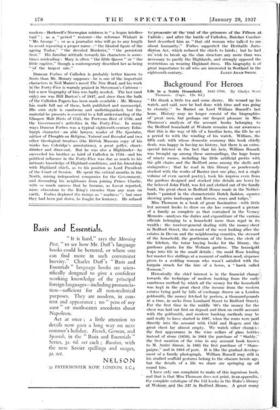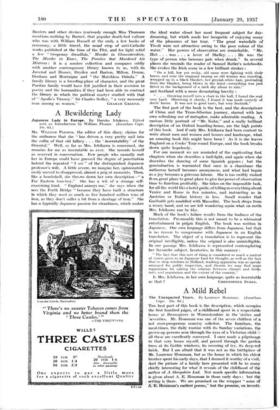Background For Heroes
" HE drank a little tea and some sherry. He wound up his watch, and said, now he'had done with time and was going to eternity." So Burnet on Lord William Russell's last hour. History may no longer consist of the biographies
of great men, but perhaps our deepest pleasure in Miss Thomson's analysis of the account books belonging to the Bedford household at Woburn remains in our awareness that this is the way of life of a familiar hero, the life he set a period to with the winding of his watch. William, the fifth earl; with whose domestic economy this book chiefly deals, was happy in having no history, but there is an extra- special interest in the fact that his heir, William Russell, was brought up among these surroundings, the huge house of ninety rooms, including the little artificial grotto with the gilt chairs and the Bedford arms among the shells and stalagmites ; that he read in this library so ponderously stocked with the works of Baxter (not one play, not a single volume of even sacred poetry), took his impress even from the gardens designed and stocked (the details are here) by the beloved John Field, was fed and clothed out of the family bank, the great chest in Bedford House made in the Nether; lands " painted in the characteristic Dutch fashion, squares showing prim landscapes and flowers, roses and tulips."
Miss Thomson in a book of great fascination—with little but account books to draw on she has composed a picture of a family as complete as that contained in the Verney Memoirs—analyses the duties and expenditure of the various officials belonging to a household more than regal in its. wealth : the receiver-general dealing with the money chest' in Bedford Street, the steward of the west looking after the estates in Devon and the neighbouring counties, the steward of the household, the gentleman of the horse, the clerk of the kitchen, the tutor buying books. for the library, the gardener plants for the 'Woburn gardens. The household leaps into life in the small details : the maid Rose lending her master five shillings at a moment of sudden need, sixpence given to a scolding woman who wasn't satisfied with the bargain struck for the hire of a horse, a hawk called Tomson."
Historically the chief interest is in the financial change"; towards the technique of modern banking from the early cumbrous method by which all the.money for the household was kept in the great chest (the income from the western estates being paid by bills of exchange drawn on a London goldsmith, the money fetched by porters, a thousand pounds at a time, in sacks from Lombard Street to Bedford Street). For the first time in the middle '60's the money for the chest was laid out first on deposit and then on credit account with the goldsmith, and modern banking methods may be said really to have started in 1687, when the rents were paid directly into the account with Child and Rogers and Ur great chest lay almost empty. We watch other changes : the first appearance in the wine cellars of glass bottles , instead of stone (1658), in 1664 the purchase of " Shably," the first mention of the wine in any account book known to M. Andre Simon, in 1665 the first purchase of " Sham- paigne," and in 1684 of port. It is like the gradual develop- ment of a family photograph. William Russell may still in his studied scaffold gestures belong to the obscure heroic age, but the details of a life we share are springing up all round him.
I have only one complaint to make of this ingenious book, and that is that Miss Thomson does not print, in an appendix, .: the complete .catalogue of the 152 books in the Duke's library
Woburn.. and the-247,in Bedford :House- A great many • Baxters and other divines (curiously enough Miss Thomson mentions nothing by Burnet, that popular death-bed vulture who was with William Russell at the end), a few books of ceremony, a little travel, the usual. crop of anti-Catholic works published at the time of the Plot, and for light relief a few twopenny dreadfuls," Murder in Gloucestershire, The Murder in Essex, The Prentice that Murdered his Mistress : it is a sombre collection and compares oddly with another contemporary library known to us, with its Juvenal and Homer, Dryden and Burton, Milton, Donne, Denham and Montaigne and " the Matchless Orinda." A • family library is a breeding-place of character, and the great Puritan family would have felt justified in their aversion to poetry and the humanities if they had been able to contrast the library in which the political martyr studied with that of "Apollo's Viceroy," Sir Charles Sedley, " a very necessary























































 Previous page
Previous page